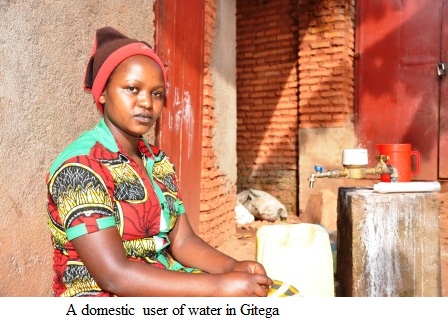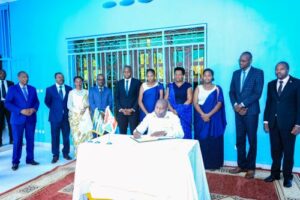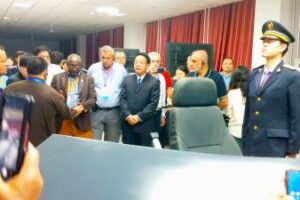By Maheburwa Gaspard
Burundi’s Political Capital and second largest City Gitega is a place of many tales. From its rapid growth story, rapid population increase, hospitality, beautiful scenery, plenty of natural resources and the settlement patterns, Gitega is the new City on the rise.
However, the story of this area is never complete without the narrative of water access challenges and how different players are grabbing the problem ‘by the scarf’ to supply the City hosting the seat of government with ‘life’.
Burundi, by virtue of its location in Africa’s Great Lakes region, has abundant water resources for its slightly above eight million people. And conditions to access clean drinking water for most Burundians both rural and urban are taking a positive way of increasing considering the new centers where water is canalized.
At the helm of water supply is the state-owned utility, Régie de Production et Distribution d’Eau et d’Electricité (Regideso)
To supply Gitega- a City of close to 20,000 people, Regideso pumps water from Ruvyironza River and also drills water from different points. However, a combination of bottlenecks as well as the ever increasing population means that not all Gitega City households have access to water.
Weathering the storm to supply water
The company’s capacity to supply drinking water to citizens has been undermined by low production, unreliable electricity supply, reduced water levels due to climate change, water losses along the network, few water infrastructures in some areas among others.
According to Manirakiza Jean-Claude, the head of the Eastern region at Regideso, unreliable power supply is a major obstacle in their operations. "If there is a power problem, the entire refueling network is affected and it causes disturbances. More than 80 percent of the water supply process requires electricity,” Manirakiza explained.

Much as the population appreciates the efforts of Regideso, they expect much more from the company. Marguerite Ndihokubwayo, a fifty-one-year-old who fetches water from one of the public taps in Ntobo district says “It takes trekking long distances to access water supplied by Regideso and this is a price enough.”
Marguerite shares this point of view with Ishimwe Thibaut from the same neighborhood, who also adds that public taps sometimes go dry for days - forcing the population to ‘flex muscles’ while fetching water from the nearby spring.
Inter-play between human activities, climate change and water resources
According to Manirakiza, the task of supplying water to Gitega City is compounded not only by climate change but destructive human activities as well.
He explains that climate change has led to water level reduction while the increase in population has resulted in encroachment on ecologically-sensitive- water catchment areas and destruction of natural vegetation to create areas for settlement and agriculture.
Relatedly, people have also constructed around water sources, destroyed water supply infrastructure in the process of construction and disrupted water supply efforts.
The struggle with climate change is not a recent phenomenon in Burundi-just like all countries in the Nile Basin.
In the past few decades, Burundi has seen more climate variability, which manifests through prolonged droughts that threaten food security, heavy rains that cause flooding leading to destruction on crops, homesteads and public infrastructure.
Temperatures in Burundi are projected to be increasing by 0.4ºC per decade and by 2050, studies indicate that temperatures in Burundi would have increased by 1.9ºC.
In the face of all these challenges, Regideso is increasing efforts to sensitise the community on climate change.
Jean-Claude Manirakiza observes that, "the plan now is to increase water production by drilling more water extraction points. This will increase the amount of water we provide to the population of Gitega to meet the daily needs," he added.
Mitigating Climate change and water supply problems
Burundi emits the lowest greenhouse gasses emissions worldwide. It ranks 188 out of the 188 countries emitting only 0.01 percent of the total global greenhouse emissions according to a report by the Netherlands Ministry of Foreign Affairs.
But this has not spared it from suffering the several effects of climate change.
For example, between 1998 to 2005, Burundi experienced several droughts has led to severe crop failure and death of about 35 percent of livestock in the country. It also experienced several floods between 2006 to 2007. Studies indicate that Burundi suffered a loss of 5-17 percent of its GDP per event according to a report by the Netherlands Ministry of Foreign Affairs.
Now, Regideso believes that efforts to mitigate climate change effects, restore the degraded environment, protect water sources as well as water infrastructure can be more successful if people play the crucial part. The utility company is engaged in community sensitisation movements.
According to Manirakiza, the community has a great contribution in implementing solutions to ensure water availability and supply of enough water. One crucial thing he says they are emphasising is rallying people to respect water sources and water infrastructure like pipes during construction. “We sensitise people to respect water sources”, he said adding that the community must know that "If we build around a water source, we force it to gradually disappear."
It is not only Regideso that is involved in sensitisation and climate change awareness. Other Public entities, Non-governmental organisations (NGO’s) and individuals are also involved.
Leonidas Nzigamasabo, an internationally renowned climate change activist and also the resident representative of World Merit is among the players at the forefront of advocating for protection of the environment.
Towards the end of 2019, World Merit Burundi in collaboration with local organizations, companies, schools, media as well as government, launched the "Bujumbura Clean Up" campaign. The drive aimed at removing all plastics from the shores of Lake Tanganyika. The drive attracted more than 5000 participants but reached many more with key messages on environmental protection.
Nzigamasabo explains that they have carried out different activities in Gitega as part of climate change resilience promotion.
On top of the Bujumbura Clean Up project, the organization has launched a tree planting campaign on Mboza hill overlooking the City of Bujumbura. This hill is a mega water source that supplies water to Bujumbura City and many villages in Kanyosha Municipality in the province of Bujumbura.
On his part, Pierre Ndimurukundo, President and Legal Representative of the Burundian Association for Cities and Environmental Protection (APPEV) says that they are also engaging inhabitants of Cities and urban centres to spearhead protection of the environment.
He explains that they sensitise people to take lead in ensuring cleanliness of cities and urban centres as well as in environmental protection especially of lakes and rivers.
According to Ndimurukundo, they have managed to create awareness among people about the importance of clean cities but also have managed to encourage people to restore forests and plant fruit trees to protect the environment with major emphasis on water catchment areas.
It is true Regideso is braving it all to supply water to Gitega and much has been achieved. Its efforts and those of other entities however need to be sustained and supported to help Burundi to take the much needed strides to meet the United Nations' minimum international standard of one tap for every 500 people.
This reporting project by InfoNile was supported by Code for Africa with funding from the National Geographic Society




